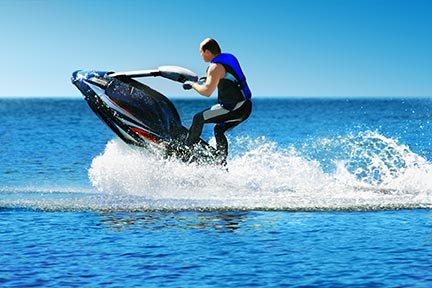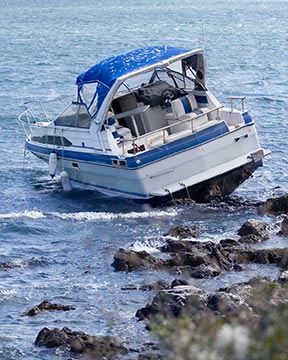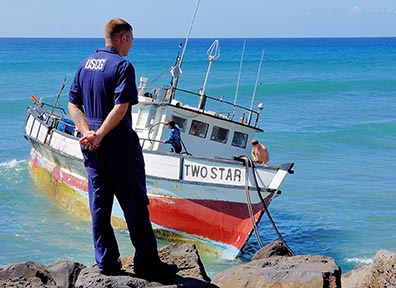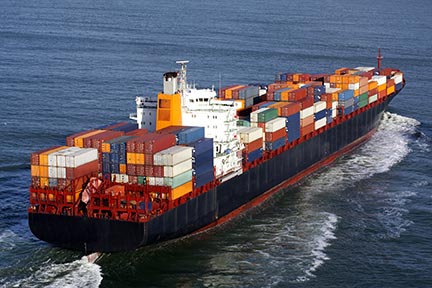Dallas Boating Accidents Lawyer | Dallas Ski Boat Accident Attorney | Fishing Boat Accident Attorney | Lake Boat Accidents
According to an official count, Texas has 595,000 registered boats, ranking it 6th in the country. Every year thousands of Dallas and Dallas County citizens plan a trip to go boating or swimming with their friends on Lake Brownwood, or a farther trip to one of the many rivers and bays in other parts of Texas. Most of the time, these trips create fond memories of summer. Unfortunately, however, not every trip to Lake Brownwood around Dallas ends happily. If you or a loved one have been injured in a boating accident, contact a boating accident attorney immediately because you only have two years from the date of injury to file your claim. A Dallas boat accident lawyer will look out for your interests and provide you with advice on the best course of action.
What are the common causes of boating accidents?
1. No Brakes
Unlike cars, boats and jet skis do not have brakes. Once they are in motion they can only maneuver to avoid an accident. Though some boats have an option to reverse causing a lesser speed at impact, the accident still occurs. Often though, by the time the people involved in the accident realize what is about to happen it is too late to prevent it.
2. Alcohol and/or Drugs
One of the largest factors in boating accidents is alcohol. It is well documented that a person’s reaction time is hindered when under the influence of alcohol. According to BOAT US, in fact, alcohol plays a role in 50% of all boating accidents. In Texas, laws similar to those governing drinking and driving apply to incidences of drinking and boating. Game Wardens enforce the Boating While Intoxicated (BWI) law, and any person who appears impaired by alcohol use and/or who has a blood alcohol level (BAL) of 0.08 or above while operating a boat can be arrested for BWI. An arrest for BWI can carry up to 180 days in jail, a fine up to $2,000, or both. Moreover, any person caught drinking and boating can have their drivers’ license automatically suspended. The bottom line is that the State of Texas will not tolerate boater recklessness, especially when drinking is involved.
3. Alcohol & Sun Exposure
 In addition to drinking, many boaters fail to take into account that they will be out in the sun all day. As a result, they are more likely to become drunk from less alcohol due to the dehydration from the sun. The best way to ensure a safe boating experience is to have the person driving the boat not drink alcohol. Boating and drinking do not mix!
In addition to drinking, many boaters fail to take into account that they will be out in the sun all day. As a result, they are more likely to become drunk from less alcohol due to the dehydration from the sun. The best way to ensure a safe boating experience is to have the person driving the boat not drink alcohol. Boating and drinking do not mix!
4. Weather
Another common cause of boating accidents is the weather. While Texas generally has ideal, sunny weather, when you are out on the water a small storm can easily lead to tragedy. The combination of high winds, rain water, and swells of the waves or wake from other vessels can easily lead to boats colliding or turning over. It takes an experienced boater to be able to weather a storm in a boat. In addition to storms, the sun reflecting off of the water leads to increased chances of boaters to suffer from heat stroke and heat exhaustion. When suffering from heat stroke or exhaustion a common symptom is to faint and if the boater is boating alone then while he is unconscious there is an unmanned vessel on the water. Obviously, this can lead to serious injury.
5. Inexperienced Boaters
Finally, the most common cause of boat accidents are inexperienced boaters being put into dangerous and unfamiliar situations. Similar to the road, the waterways have rules that govern how boats are supposed to interact when passing one another. When one person fails to know these rules it can easily lead to boating accidents. To learn these rules, every boater should take a boater safety course. Click here to go to the Official Texas Boating Safety Course, developed for the Texas Parks and Wildlife Department.
There is no excuse for a person that plans to man a watercraft not to take a boater safety course. Some of the courses only charge if you successfully complete the course. On top of that, the course will likely pay for itself because, after certification, you can talk to your boat insurance company about lowering your boat insurance premiums.
Principles of Safe Boating:
- Wearing life jackets save lives.
- Designate a driver. Sober boating saves lives.
- Boater Education saves lives.
- Safe boats save lives.
Who is responsible and what can I recover if I hire a Dallas Boat Injury Lawyer?
Typically the person who caused your injury is who your Dallas Boat Accident lawyer will sue to make you whole. Under Texas law, a person is responsible for your injury if they acted negligently. It is important to contact a Dallas boat accident attorney or Dallas County boat injury lawyer because, depending on the facts of your boating injury, you may be able to sue other parties in addition to the person who was driving the boat.
If you have suffered an injury due to another person’s negligent boating, your Dallas boat accident lawyer can recover for the following damages from the negligent boat owner or operator:
- Medical bills and/or funeral costs
- Cost of any therapy
- Cost of long-term care
- Property damage
- Loss of income
- Pain and suffering
Injuries arising from Jet Ski, Skiing, Races, Regattas and Unsafe Operation
As a state with the sixth most boats in the entire country, Texas has an extremely comprehensive statute governing boating and water safety. As referenced, the Texas Water Safety Act is a tool available to Dallas personal injury lawyers and it is essential that your Texas boat injury lawyer be fully aware of its contents. DotCO Law Marketing, L.L.C. has published, in this site, the entire Act for your reading. Click here to read the full text of the Texas Water Safety Act, and here if you would like to read a concise summary of its main points.
Call a Dallas Lake Boat Injury Lawyer or Dallas Fishing Injury Attorney Today
Many boating accidents occur at night when people are coming in after fishing all day. Unfortunately, many times they do not want to end their fun, and they stay out on the water well past dark, creating a more dangerous boating situation. Too many times, small fishing boats are not equipped with running lights or radar, causing collisions between boats. Injuries sustained in these collisions can be very dangerous and can sometimes also result in a drowning. This is especially true because people dislike wearing life preservers, or personal flotation devices (PFDs), and if you are knocked unconscious, this can easily cause you to drown. If you have suffered an injury as a result of another boater’s failure to properly follow the rules and regulations required by Texas law, contact a Dallas boat accident law firm.
Duck Boat Injury Lawyer
If you are a duck hunting enthusiast, then there is nothing better than getting in your duck boat and taking it out for a hunting trip. As a duck hunter, you know that the sport presents numerous risks for injury, ranging from gun misfires to accidental shootings. In addition to the regular dangers of hunting, duck hunting adds to the equation a large list of boating dangers, such as running the boat aground and boat collisions. If you have to utilize a boat to get to a blind and someone is injured in the boat due to the driver’s negligence of the, contact a Dallas duck boating incident lawyer today.
What do I do if I am involved in a boating accident or witness an accident?
If you have been in a Central Texas boating accident or have witnessed one you must stop and provide whatever assistance is necessary to the victims of the accident. This duty, however, does not require you to provide assistance that will place your boat or its passengers in danger.
After a boating accident, you should also give the other party some basic information that will help in any later dealings. This information should be given to any individuals injured in the accident, the boat owner, and the owner of any property damaged in the accident, and should include, at the least:
- Your name
- Your address
- Your Certificate number
Also, you should always report any significant accident to the Texas Parks and Wildlife Department. A significant accident would include situations where there is a death, a disappearance suggesting serious injury or death, bodily injury to at least one party requiring medical attention beyond simple first aid, or property damage over $500, including damage to surrounding docks or boats. As soon as possible, you should submit an accident report. Click here to download the Texas Boating Accident Report Form.
Mail boat accident report forms to:
4200 Smith School Road
Austin, Texas 78744
Attn: Law Enforcement Division
Le.marine@tpwd.state.tx.us
If you have to report a boating accident please contact a boating accident lawyer to assist you in preparing the forms that Texas law requires you to fill out to ensure that your interests are protected.
 Does Texas law require me to have any specific equipment on my boat?
Does Texas law require me to have any specific equipment on my boat?
Texas applies federal law specifying what safety equipment must be present on boats and other watercraft in the state. These laws are codified at 33 C.F.R. 175 (Federal Equipment Requirements) and 46 C.F.R. 25 (Fire Extinguisher Requirements). Texas implements these requirements through Title 31 of the Texas Administrative Code, the Texas Water Safety Act. You may view the Act by clicking here. An abbreviated explanation of equipment requirements is as follows:
Fire Extinguishers
In Texas, outboard motorboats less than 26 feet long of open construction and not carrying passengers for hire, are not required to carry fire extinguishers. Fire extinguishers are required if one or more of the following conditions exist: (1) Closed compartment under thwarts and seats wherein portable fuel tanks may be stored. (2) Double bottoms not sealed to the hull or which are not completely filled with flotation material. (3) Closed living spaces. (4) Closed storage compartments in which combustible or flammable materials are stored. (5) Permanently installed fuel tanks. (6) Inboard engines. Fire extinguishers should be U.S. Coast Guard approved. The Texas Water Safety Act specifies further detail for which types of fire extinguishers are acceptable and when they are necessary.
Lifesaving Devices - Personal Flotation Devices (PFDs)
PFDs must be U.S. Coast Guard approved, in serviceable condition, readily accessible, and of the proper size for each person on the boat. Children under 13 years old in any vessel under 26 feet long must wear a U.S. Coast Guard approved PFD while underway. Underway is defined as not at anchor, made fast to the shore, or aground. All vessels, including canoes and kayaks, must be equipped with PFDs. Vessels 16 feet and longer, except for canoes and kayaks, must be equipped with a particular type of PFD for each person on board. Specific rules and restrictions apply to the use of inflatable PFDs. For a full explanation, please consult the Texas Water Safety Act.
Mirrors
Every motorboat towing a person must either have an observer, other than the operator, who is 13 years old or older OR is equipped with a rearview mirror at least four inches, measured from bottom to top and side to side.
Navigation Lights
When not at dock, all vessels, including motorboats, canoes, kayaks, punts, rowboats, rubber rafts, or other vessels must have and display at least one bright light, lantern, or flashlight visible all around the horizon from sunset to sunrise in all weather and during times of limited visibility. Click here to read further requirements for boat navigation lights.
Sound Producing Devices
Any vessel less than 12 meters long (39.4 feet) is required to carry a whistle or horn, or some other means capable of producing an efficient sound to signal intentions and position in periods of reduced visibility. Vessels 12 meters (39.4 feet) long or greater are required to carry a whistle or horn and a bell on board.
Here is a list of common sound signals that are used on the waters. We recommend that you keep a list of these signals on your boat so that you can properly communicate with other boater on the water:
- Warning Signal: one prolonged blast
- Danger Signal: Five or more blasts
- Port Side Passing: 1 short blast
- Starboard Passing: 2 short blasts
Flame Arresters (Backfire Flame Control)
Gasoline engines installed in a vessel after April 25, 1940, with the exception of outboard motors, must be equipped with an acceptable means of backfire flame control. The flame control device must be properly attached to the air intake with a flame-tight connection. Additionally, the device must be U.S. Coast Guard approved or comply with SAE J1928 or UL 1111 standards and marked accordingly.
Exhaust Water Manifold; Muffler
All motorboats in Texas must be equipped with an exhaust water manifold or a factory type muffler installed on the engine.
Click here for a full explanation of Texas Safety Requirements for Vessels.
Some of Texas’s Many Water Bodies
| Canyon Lake | Lake Fayette | Somerville Lake | Lake Travis | Buchanan Lake | Lake Lyndon B. Johnson | Horseshoe Bay |
| Belton Lake | Stillhouse Hollow Lake | Lake Whitney | Lake Waco | Richland Chambers Reservoir | Navarro Mills Lake | Fairfield Lake |
| Bardwell Lake | Lake Tawakoni | Cedar Creek Reservoir | Lake Fork Reservoir | Lake Dallas | Joe Pool Lake | Grapevine Lake |
| Benbrook Lake | Lake Ray Hubbard | Lavon Lake | Lake Ray Roberts | Eagle Mountain Lake | Lewisville Lake | Lake Bridgeport |
| Lake Texoma | Lake Arrowhead | Lake Kickapoo | Lake Kemp | Hubbard Creek Lake | Possum Kingdom Lake | Lake Stamford |
| Lake Fort Phantom Hill | Lake EV Spence | OC Fisher Lake | OH Ivie Lake | Twin Buttes Reservoir | Amistad Reservoir | Choke Canyon Reservoir |
| Lake Conroe | Lake Corpus Christi | Nueces Bay | Aransas Bay | Copano Bay | Redfish Bay | Mesquite Bay |
| San Antonio Bay | Hynes Bay | Espiritu Santo Bay | Green Lake | Mission Lake | Saint Charles Bay | Lake Atascocita |
| Matagorda Bay | Lavaca Bay | Keller Bay | Cox Bay | Carancahua Bay | Turtle Bay | Tres Palacios Bay |
| Oyster Lake | Cooling Water Reservoir | Lake Austin | Christmas Bay | Chocolate Bay | West Bay | Galveston Bay |
| Greens Lake | Harris Reservoir | Bayou Vista | East Bay | Trinity Bay | Lake Anauac | Dutton Lake |
| Lost Lake | Town Lake (Lady Bird Lake) | Clear Lake | Nassau Bay | Lake Houston | Lynchburg Reservoir | Scott Bay |
| Crystal Bay | Burnet Bay | Black Duck Bay | Upper San Jacinto Bay | Tabbs Bay | Baffin Bay | Laguna Madre |
| Falcon Reservoir | Alazan Bay | Medina Lake | Lake JB Thomas | Natural Dam Lake | Lake Diversion | North Fork Buffalo Creek Reservoir |
|
The Texas Parks and Wildlife Department’s Boating & Fishing website has extensive information regarding boating and fishing laws, requirements, safety practices, and more. Click here for a variety of legal forms relevant to Texas boaters, including Accident Reporting, Title and Registration, Vessel/Boat Records Maintenance, Release of Lien, Lien Foreclosure Sale, and a number of other forms that may interest you if you are a boat owner or have been involved in a Texas boat collision. Click here for online boat registration.
Texas Parks & Wildlife Department - Austin Headquarters
Texas Parks & Wildlife Department |
Important Texas Boating Statutes |
The Texas Water Safety Act sets for rules governing boater education, required safety equipment for personal watercraft, operation of vessels and minimum age requirements, Texas boat registration and title requirements, transfer of vessel ownership, requirements for boat identification, boat certificate fees, operation of a boat in another state, and abandonment or destruction of a boat or vessel. Additionally, it explains what safety equipment is required on all Texas boats, mandatory vessel inspection by Texas game wardens and other peace officers, accidents and casualties related to boating, and the duty to stop and render aid. Finally, the Act sets forth penalties, punishments, alcohol and intoxication offenses, and a number of other provisions relevant to all Texas boat owners or injury victims.
Duty To Stop & Render Aid
Under the Texas Water Safety Act, the operator of any vessel that becomes involved in a boating accident must stop and render whatever assistance is necessary unless such action would endanger his own vessel, crew, or passengers. Additionally, the operator must give his or her name, address and vessel identification number in writing to any injured person and to the owner of any damaged property. If a driver fails to comply with this provision in an accident that results in death or serious bodily injury, the driver may be punished with a Texas Parks and Wildlife Felony. Failure to comply in an accident that does not result in death or serious bodily injury is considered a Texas Parks and Wildlife Class A Misdemeanor.
To read the full text of the Texas Water Safety Act, click here. Additionally, the Texas Parks and Wildlife Department has published a more concise Digest of the Texas Water Safety Act, which you may view here.
Personal Injury Lawyers Serve Dallas and Surrounding Cities
Serving clients throughout Central Texas, including Addison, Allen, Arlington, Audelia, Balch Springs, Bedford, Cedar Hill, Carrollton, Cockrell Hill, Coppell, Dallas, Dalrock, De Soto, Duncanville, Farmers Branch, Ft. Worth, Forney, Garland, Glenn Heights, Grapevine, Grand Prairie, Highland Park, Hutchins, Irving, Lancaster, Lewisville, Mansfield, Mesquite, Midlothian, Murphy, Plano, Richardson, Rockwall, Rowlett, Sachse, Seagoville, Sunnyvale, Trinity Mills, University Park, Wilmer, Wylie, areas in the vicinity of Dallas-Ft. Worth International Airport, and other communities in Collin County, Dallas County, Denton County, Kaufman County, and Rockwall County.
Contact a Dallas Recreational Boating Accident Lawyer today for a free initial consultation regarding your boat or jet ski accident.
